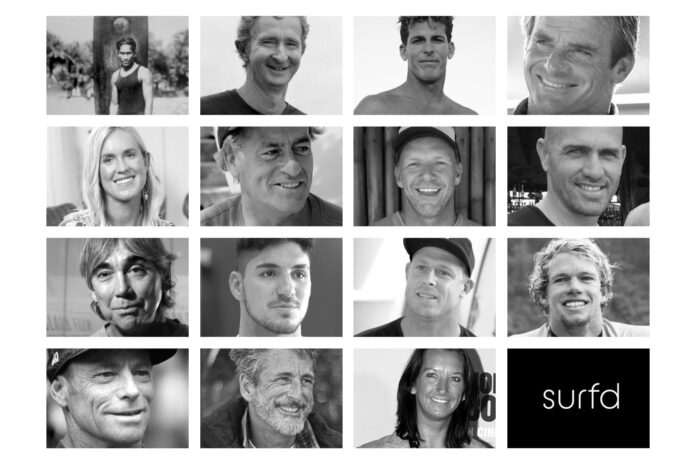Since the conception of professional surfing, there has always been a massive dichotomy that existed in the sport. Those rare few who get a chance to compete and exist inside the bubble of the world tour, and the 99.99999% of the rest of us. It is almost the yin and yang that exists within surfing. The “modern” pioneers of surfing and surf culture back in the 60’s and 70’s would have laughed at you if you told them that one day you would get paid millions of dollars to just go surf. But then the world tour came along, and it happened. From the moment pro surfing took off, it took a once countercultural thing on the fringes of society and put it squarely in the mainstream. Surfers started to be seen more as professional athletes and less as misfits. As the money started pouring in and the popularity grew exponentially around the globe, surfing was now at a crossroads. Nat Young famously said, “I wish I never called surfing a sport.” It was now morphing from a lifestyle and turning into an industry/business of its’ own. The intentions of these pioneers of surfing were never for it to turn into a global phenomenon that can shift social paradigms. Yet, thanks to the rapid influx of cash and popularity growth in surfing, there are thousands of people just like myself that can’t thank it enough for being put in my consciousness. Without the mainstream media coverage of this sport, I might have never found the greatest thing on earth. The joys of simply riding a wave. With this two sides of the same coin type scenario playing out, I think it’s important to pay homage not only to the pioneers of this sport out of competition, but also to those who took surfing to heights it could have never imagined in competition.
Outside competition:
Duke Kahanamoku

Regardless of competition or not, there simply is no bigger or more important figure in the sport of surfing than Duke Khanamoku. In the early 1900’s surfing was still something that had yet been discovered by the western world and was entirely a Hawaiian and Polynesian pastime. Having grown up on the white sand beaches of Waikiki in precolonial Hawaii, Duke was immersed into this profound love for the ocean and surfing that the ancient Hawaiians had. After breaking the 100-yard freestyle world record by some four seconds in 1911, in open water, he found himself heading to Stockholm for the 1912 Olympics. Those summer games would not only change Duke Kahanamoku’s life forever, but also surfing as we know it. He went on to win both a gold and silver medal and returned to the states a national hero. From 1912-1914 he circumnavigated the globe to give a series of “swimming exhibitions” that would open pandora’s box forever. It was on this tour that he proudly brought around his traditional Hawaiian wooden surfboard and gave the world their first glimpse of surfing. Some of the most surf mad places on planet earth, Southern California (1912) and Australia (1914), both got their first taste of surfing thanks to him. Without him carrying the torch and waving the flag for surfing around the globe in the early days, who’s to say where it would be today.
Gerry Lopez

Mr. Pipeline himself, Gerry Lopez. Just saying his name alone paints the iconic picture of him standing tall and relaxed on his lightning bolt board in the guts of a glassy A-frame. In the late 60’s and early 70’s, the now world-famous Banzai Pipeline seemed like more of a gladiator’s pit than a career launching pad. Just surviving a wave was success alone. Then came along this long-haired yoga and meditation practitioner from Honolulu that would revolutionize the sport. Taking his Zen like focus out into the water, along with his custom-made Lightning bolt board, he was able to turn surfing this beast into an art form. Unlike other’s who seemed to be fighting the wave, he seemed to be in tune with it. He took this Zen like calm and understanding of the ocean to then yet undiscovered places such as G-Land. Surfing will forever be in debt to him for what he has done in the water, but humanity will forever be in debt for what he has done out of the water. He treats every single person with as much kindness and humility as the next and will forever be the moral compass of surfing.
Brenden Margieson

Brendan Margieson, Margo, is widely regarded as the first full time professional free surfer. In the 90’s when pro surfing was exploding in popularity and money was pouring in from everywhere, he did almost the unthinkable and decided to chase perfect surf instead of world titles and riches. While the idea of free surfing was nothing new at this point, it’s legitimately what the sport was founded on, the idea of being a paid free surfer was new. No one had done it before, and no one knew it could be done. With every successful surf movie, magazine cover and photo shoot, he helped lay a little bit more of that golden brick road that today’s generation is reaping the rewards of.
Tom Curren

Tom Curren is surfing’s spirit animal. A mercurial talent that is as mystical as he is smooth in the water. A man that despite having won three world titles and thirty-three events on tour, is oddly more so remembered for what he’s done outside of competition. In 1992 Rip Curl would release the first of an ongoing series that would change the surfing world entitled “The Search”. In these films not only are you seeing some of the best waves on earth in some of the most remote spots on earth, but also it taps right back into the foundation of surfing. “The Search” for perfect empty waves is what drives all surfers. In a time when professional surfing was about to kick everything into overdrive, this reminder of what surfing is truly about still resonates to this day.
Laird Hamilton

Laird has not only spent decades smashing through glass ceilings as to what type of waves are rideable, but also through the glass ceilings of how to ride waves. He has ridden some of the most famous waves ever photographed, the millennium wave at Teahupoo, AND has pioneered a style of surfing that has revolutionized the sport. Tow in surfing. Not only was this a style of surfing never seen before, but it was also opening up pandora’s box as to what is and isn’t rideable as a wave. What started off as a pack of lunatics riding 50-foot waves at Jaws, has now led to an entire industry that is solely dedicated to riding the biggest waves on earth.
Bethany Hamilton

This one has to be on here without saying right? How can you not?! She is one of the most inspirational athletes of all time and has one of the most inspirational stories of all time. To not only survive every surfer’s worst nightmare, a shark attack, but to not let that stop or define you is the stuff movies are made of. Spoiler alert, they made a movie on her story called Soul Surfer. Following her attack, she wasted no time feeling sorry for herself and was back surfing within 30 days and was in a contest within 60 days. Still to this day she not only surfs as much as possible, but absolutely rips as well. She most recently was seen competing in the 2022 Volcom Pipe Pro. Most people are scared out of their mind surfing Pipeline with all their extremities, yet here she is hucking herself over the ledge with only one arm. No one has any excuses ever again.
Inside Competition:
Kelly Slater

With his eleven world titles spanning over three decades, apart from Duke, Kelly Slater is arguably the most influential surfer in history. He took the flag of surfing that the early pioneers were waving and planted on the moon. Kelly is surfing’s Tiger Woods, or Michael Jordan. These types of people are not only the face of a sport, but they also vicariously become the sport as well. It’s impossible to separate the two. While the history books will forever show the concrete evidence of Kelly’s dominance, his lasting impact is playing out in front of our eyes. Every surfer on the world tour currently would have all grown up looking up to and idolizing Kelly. What they are doing on tour today is not only some of the best surfing we’ve ever seen, but they are doing things on a surfboard we could have never imagined seeing. And well all owe The Goat, a massive thank you for that.
Tom Carrol

In the late 1980’s when pro surfing was in an era that was being dominated by larger-than-life egos and muscles, one man stood out above the crowd. Pun intended, TC is only 5’7” or 169 cm. After smashing onto the scene in 1979 by making the final of the Pipeline masters in his rookie year, he steadily rose the world rankings all the way to his first of two back-to-back world titles in 1983. While 1984 ended up being the last of his world titles, his impact on the sport did not stop there. He lays claim to one of the most iconic and pivotal moments in the sports history. In the 1991 Pipe Masters semifinals, Tom showed that the future of the sport was combining small wave performance with big wave energy ocean. Or as it is now known, the snap heard round the world. In one single move, he now set a new bar as to what is possible on what kind of waves.
Mick Fanning

At the time of winning his first of three world titles in 2007, it not only was a massive personal achievement, but it was also a seminal moment for the entire nation of Australia. While Hawaii will always be the true home of surfing, Australia could be considered the spiritual home of surfing. No other nation has become more surf mad or progressed the sport more than them. From being the birthplace of professional surfing and the first eight out of nine men’s world champions, all the way to progressing surf culture through Tracks Magazine, surfing is in their DNA. When Kelly Slater burst onto the scene in 1992, this once dominant surf nation went on to only win one world title in the next fourteen years on the men’s side. Enter 2007 and Michael Eugene Fanning. This not only started off his illustrious career but reignited an entire nation.
Lane Beachley

There is only one athlete in the history of professional surfing that has won six, yes six, titles in a row. Kelly Slater? Wrong. Lane Beachley. What Lane did, has not and likely will not ever be repeated. What she started with her first world title in 1998, can only be described as pure and otter dominance of Women’s surfing by Australia. Lane was the catalyst to a streak that saw Australia bring home the world title in twelve of the next thirteen years. She trailblazed the path for future all time greats like Stephanie Gilmour, and showed her not only how to succeed, but how to have prolonged success as well.
Andy Irons

Every superhero needs a villain to come along to show them they have an equal, to force them to raise their game to unexpected heights. In this analogy, Andy is the Joker to Kelly Slater’s Batman. There is a very aptly named documentary highlighting this rivalry entitled, “A fly in the champaign.” Following Kelly’s retirement from pro surfing in 1998, a void we left on tour. That void on tour and in surf fans hearts was soon filled by a take no prisoners, balls to the wall hell man out of Kauai. If Kelly was cold and calculated, Andy was raw and ruthless. He surfed his way to the 2002-2004 world titles on raw emotion and skill alone. There wasn’t a section or wave on earth he surfed scared. He only had one speed, attack. It was this bravado and the natural rivalry between him and his older brother Bruce that saw surfing get pushed literally over the ledge. The way that they both would fall out of the sky on waves at Pipeline and Teahupoo right into a pigdog backside tube stance, changed the way barrels would be ridden forever.
Mark Richards

Mark Richards, MR, was the Kelly Slater before there was Kelly Slater. For those of us that were born in the 80’s or 90’s, he just seemed like a part of an old timers “back in my day” stories. Upon some further review, the comparisons are beyond merited. He not only won four consecutive world titles (1979-1982) cementing himself as the most dominate surfer in the world, but he did it all on boards he shaped himself. In an era when we started seeing the emergence of thrusters set ups in surf boards, MR stayed to his tried-and-true twin fin set up. Like fashion trends, it seems that surfboard set ups are a cyclical as well. As more and more twinnies are filling the lineup and the walls of our local surf shops, we all have Mark Richards to thanks for keeping the dream alive.
Gabriel Medina

While Gabriel Medina wasn’t the first Brazilian ever on the pro tour, he was the first one to win a world title. If Gabe’s title the first domino to fall, what followed was an avalanche. It was not only that he won, but it was how he won. He was surfing and winning in a way that was uniquely Brazilian. A nation that is littered with beach breaks and lacks the deep energy power of the Pacific Ocean, helped mold Gabe and his compatriots into ariel wizards. While everyone else was focusing on barrels and turns, Brazilians were taking it to the air. Following his 2014 victory, Brazil has now won six of the last eight men’s world titles, and the last four in a row. Thanks to Gabriel’s groundbreaking title, the Brazilian storms seem to be going nowhere anytime soon.
John Jon Florence

John Jon Florence’ has not only proven over the past decade that he is the most well-rounded surfer on planet earth, but when healthy, he is the best surfer on planet earth period. Wither he is boosting airs that redefine progression, or he’s riding forty-foot waves with the demeanor of someone else riding a two-foot wave, everything he does sets a new bar. Despite having suffered set back after set back in the way of injuries, his back-to-back world titles in 2016 and 2017 showed that when he is at 100%, no one else stands a chance. Along with Kelly Slater, John Jon Florence is only one of two men on earth that hold both world titles and the world-famous Eddie Aikau memorial big wave trophy. Whenever you and Kelly Slater are the only two to ever do something, say no more.
Luke Egan

I know you might be asking, how can someone who only has four career wins on tour be one of the most influential surfers in competitive history? Great question. The reason is what he helped create on tour, not what he accomplished. The Dream Tour. From the adolescent days of pro surfing, they knew that they would need people to attend to help grow the sport. When do people go to the beach? Summer. So essentially the tour just followed summer around the whole year. As surfers, we know that what’s the worst time of year for waves? You guessed it. Also summer. Luke and the rest of the tour got so sick of having to follow one foot mush all over the world, while the free surfers got the best waves of their lives elsewhere. Luke led the rest of the competitors in forcing the tours hand. Either take us to the best waves around the world at the best times, or we are out. Thanks to the fruits of their labors, now we get to see the best surfers in the best waves on planet earth.






